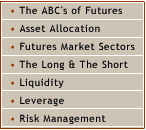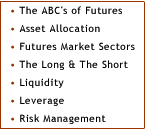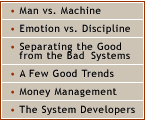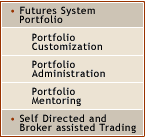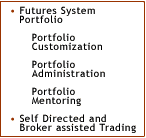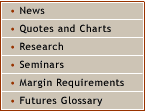• What
is a Futures Contract?
A futures contract is a standardized, exchange-traded, legally binding agreement
to buy or sell a specific type, quantity or grade of a commodity or financial
instrument at an agreed upon time and place in the future.
Futures contracts are highly regulated by market exchanges-New York Board
of Trade, New York Mercantile Exchange, Chicago Mercantile Exchange, Chicago
Board of Trade, London Metals Exchange, Eurex Frankfurt, Singapore Exchange-that
set the contract specifications for cash and futures contracts.
The value of a futures contract is tied to the underlying asset.
| Contract |
Contract Size |
Price |
Value |
| T-Bonds |
$100,000, 30-Year U.S. Gov't debt |
1-15 |
$115,000 |
| Crude Oil |
1000 Barrels at the contract price |
30.00 |
$30,000 |
| Wheat |
5,000 Bushels at the contract price
|
4.00 |
$20,000 |
| Silver |
5,000 Troy Oz. at the contract price |
4.75 |
$23,750 |
| Euro |
125,000 Euros at the contract price |
110.00 |
$137,500 |
| S&P |
500 $250 times the index price |
900.00 |
$225,000 |
|
|
|
• Who
Trades Futures?
Similar to stock and bond trading by institutions and individuals, futures
are traded by manufacturers, agricultural, industrial and commercial interests
and banks and financial institutions. Futures markets also welcome individual
investors as sources of added liquidity and shareholders in risk. However, unlike
huge commercial interests that take delivery on contracts, individuals always
offset their futures positions prior to contract expiration in order to avoid delivery.
What is the role of futures in asset diversification? Learn
more about asset allocation >>
|











